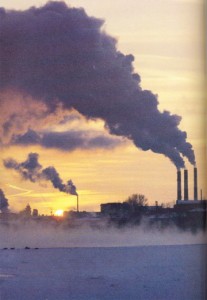Guyana Review reports on a recent environmental conference in Manhattan which focuses on the creation of jobs that can help in the global fight against the potentially cataclysmic consequences of climate change
As the global agenda becomes increasingly preoccupied with the issue of climate change and its likely implications for the quality of life on the planet, people the world over are seeking to fashion a multi-disciplinary response to the challenges posed by the threat of cataclysmic environmental change.
The impact of various forms of economic activity on environmental change has had the effect of galvanizing some of the best scientific minds in both developing countries with a view to determining how to preserve the environment while ensuring minimal job losses.

Recently, the Manhattan-based Carnegie Council hosted a forum dedicated to studying the outcomes of a new report titled “Green Jobs: Towards Decent Work in A Sustainable, Low-Carbon World.” The Report, which contains the first global overview of the issue of Green Jobs, the preceding study for which was commissioned by United Nations Environment Programme in collaboration with the International Organisation Labour Organization, the International Organization of Employers) and the International Trade Union Confederation.
So what are green jobs?
Green jobs are forms of employment that are mindful of the importance of minimizing the impact of the particular activity on the environment. What Green Jobs seek to do is to reduce environmental fallout to levels that are regarded as sustainable and, as far as possible, to repair environmental damage. The Report locates Green Jobs as work in the agricultural, industrial, services and administration sectors – sectors which it says, have played a role in preserving or restoring the quality of the environment.”
Some of the most critical Green Jobs are to be found in the energy, mining, agricultural, construction and transportation sectors. These sectors have made an important impact in helping to cut the consumption of energy, raw materials and water through high-efficiency strategies designed to ‘de-carbonize’ the economy, to reduce greenhouse gas emissions, to minimize waste and pollution and to protect and restore the ecosystems.
The lessening of the impact of the human footprint on the environment arising out of Green Jobs is generally thought to be gradual. Different jobs contribute to the process to different degrees. The Green Jobs Report points out, for example, that “workers manufacturing fuel-efficient or hybrid cars, for example, contribute less to reducing emissions from transport than those working in public transport systems. Moreover, what is considered fuel-efficient today will no longer qualify in ten years’ time. The notion of a green job is thus not absolute, but there are ‘shades’ of green and the notion will evolve over time.”

One of the authors of the report, Michael Renner, a Senior Researcher and Director of the Worldwatch Institute’s Global Security Project in Washington told the forum that there are different degrees to which we can expect progress toward a more sustainable environment. He notes, for example, that the current focus on Green Jobs was likely to result in employment cuts in the fossil fuels and mining sectors. Renner also believes that in the years ahead some forms of economic activity including fossil fuel and conventional waste disposal will be replaced by heightened emphasis on renewable energy, in the case of fuel exploitation and recycling in the case of waste disposal. Renner predicts “ a certain kind of transformation,” adding that this may bring about a change of methods and technology for greater efficiency.
Director of The Global Labor Institute Sean Sweeney who helped prepare the Report says that there will have to be a global transition over the next two to three decades.
Meanwhile, The International Energy Agency (IEA) warns that research and development investment aimed at striking a more aggressive pro-environment posture is not adequate, since a great deal of investment continues to go into fossil fuels, in effect, destroying organic life. Sweeney has also noted that the level of carbon being captured continues to be low and not expected to reach a significant scale for at least the next 20 years since power companies are reluctant to invest in alternative technology in view of fears that real returns may still be decades away.
According to Sweeny with the global military budget reaching US$12 trillion annually – the United States reportedly spends half of that amount – there are current areas of global expenditure that can be cut to invest more heavily in the creation of Green Jobs. At the same time he believes that because the environmental challenge is global in nature both the investment and the returns should be shared.
While the number of Green Jobs across the world are expected to grow, Sweeny believes that the rate of growth must be ‘managed.’

“The greening of economies and provision of decent work for just a few will not suffice to meet the environmental and social challenges currently faced worldwide. Such a piecemeal approach will generate neither the consensus nor the momentum needed to avert climate change and will be hardly conducive to the creation of stable societies,” says the report.
The report advocates a just transition both for those affected by the transformation to a green economy and for those having to adapt to climate change.
The report notes that industries concentrated in particular regions are often hard hit by transitions, particularly those as swift and as pervasive as the ones needed to reduce prevailing levels of climate change. On the other hand the forum noted that industries hardest hit by climate change and those most in need of adaptation are those in developing countries that have historically contributed least to the emissions causing global warming.
According to the report workers and trade unions are increasingly making the point that “far too little is known about both the risks and opportunities in a transition to a greener economy.” That is why future research into the viability of the Green Jobs revolution is a priority. Affected workers and communities need adequate social protection, along with access to new opportunities if they are to make the social and economic adjustments that are now widely regarded as inevitable.
Guyana’s interest in the Green Jobs revolution is self-evident in the environmental challenges that have already surfaced in some sectors of the economy. Public discourse has long begun on the impact of both bauxite and gold mining on the communities where these industries are located and the authorities have been coming under increasing pressure from environmental lobbyists to take steps to ‘clean up’ these industries. Concerns about the environmental impact of economic activity are also expected to become more acute once Guyana’s long awaited search for oil begins – possibly in a few years time.
All, however, is far from lost. Public education has ensured that there is evidence of an increased sensitivity to environmental concerns in some sectors of the economy including building and construction, transportation, agriculture and forestry. Shades of green are also evident in the integrated gasification/carbon sequestration, co-generation (combined heat and power) in the co-generation project which is part of the Guyana Sugar Corporation’s modernization programme at the Skeldon sugar factory.
Meanwhile, The Institute of Applied Science and Technology (IAST) at Turkeyen, has undertaken a biofuel project using waste oil from cooking to produce environmentally friendly fuel for motor vehicles.
At interior locations as well as in rural and urban residential areas there is also some evidence of the use of renewable energy to power dwelling houses.
The Report says that more than 2.3 million green jobs have been created in the energy sector in recent years. These jobs, however, only supply 2% of the world’s energy, a clear indication that there are still major environmental concerns about the energy sector as a whole. The report also notes that data was available only for a limited number of mostly developed countries – Germany, United States, Spain, China, Denmark, India and Brazil and that the estimates are “almost certainly conservative.”
In the transport sector the manufacture of more fuel- efficient vehicles, hybrid-electric, and fuel-cell vehicles and car-pooling are regarded as a reflection of an increasing sensitivity to environmental concerns. Similarly, changes in land-use policies and settlement patterns – reducing distance and dependence on motorized transport – reflect a similar sensitivity. While the Report sites the railway as a potentially key source of “green employment” it was noted that the trend in many countries has been towards the reduced importance of the railway as a means of public transport. Employment – both in the operation of railway lines and in the manufacture of locomotives and rolling stock – has fallen significantly. Meanwhile, according to the report, “only some 250,000 jobs in the manufacture of fuel-efficient, low-pollution and low-emissions cars can be considered ‘green’ compared with over 5 million jobs in the railway sector in China, India and the European Union alone.
In the construction sector the focus on ‘greening’centres around the installation of energy-efficient appliances equipment including, solar-heating and cooling, solar panels and ‘green buildings’ featuring energy-efficient windows, and insulation.
Just how far away we are from higher environmental standards, however, is made clear in the Report which notes that .”approximately 1 billion people worldwide live in urban slums, mostly in precarious dwellings lacking essential facilities.” This, the Report notes, poses the challenges of “improving living standards while reducing energy costs.” It also alludes to “the need for extra power generation” which it says “can be achieved by upgrading these buildings. The work involved can create jobs for unemployed or underemployed people in these communities.”
In the agricultural sector soil conservation, water efficiency, organic growing methods and the reduction of farm-to-market distance are considered to be among the priority ‘green’ pursuits. Agriculture is still the single largest employer in the world, with 1.3 billion farmers and agricultural workers and the Report states that “decades of neglect and deteriorating farm-gate prices have led to unsustainable land-use practices, bad jobs and low incomes, turning farmers and agricultural workers into the largest contingent of poor people in the world.”
While current statistics do not allow for a quantification of green jobs in the agricultural sector, the Report finds that there is considerable potential in this sector as evidenced in sustainable practices on productive family farms, organic production and successful adaptation to climate change.
The Report notes that since small farms are more labour intensive, they can, using adequate technical and infrastructural support, crop rotation, natural pesticides and other sustainable farming methods, match larger, less environmentally friendly farms in terms of their productivity.
In 2006 sales from organic farms reached $100B while a study of 1,144 organic farms in the United Kingdom and Ireland showed that they employed one third more full-time equivalent workers per farm than conventional farms. Organic agricultural land amounts to 4.3 per cent and 1 per cent of the total farm area in these two countries, respectively. Accordingly, if 20 per cent of farmland in the United Kingdom and Ireland were to be assigned to organic farming an additional 73,200 jobs would be created in the United Kingdom and a further 9,200 in Ireland.
In the forestry sector scarcity of reliable data renders it difficult to make an accurate determination as to how many of the 40 million jobs can be considered ‘green.’ Given the role of forests as carbon sinks and their role as providers of renewable raw material, pools of biodiversity, regulators of water flows and other environmental services, it is clear that green jobs in forests will play an increasingly important role in the the management of the environment in the future.
In the area of commerce initiatives like the location of stores closer to residential areas, the minimization of shipping distances – from origin of products to wholesale and retail locations – and the new service economy can contribute significantly to the greening of the environment. Additionally, industrial sectors like iron and steel, aluminum, cement, pulp and paper production account for a large proportion of energy and raw material used as well as with greenhouse-gas emissions. On the other hand , the economic pursuits account for a relatively small number of jobs globally. Fewer than 300,000 jobs in the iron, steel and aluminum sectors can be considered to have any “shade” of green whatsoever.
The best option for reducing the impact of these industries appears to be through recycling, a pursuit that has given rise to a huge global scrap metal trade. Secondary steel production, based on recycled scrap, requires 40%-75% less energy than primary production and is generally regarded can therefore be seen as a ‘proxy’ for greener production.
Globally, an estimated 200,000 jobs are provided through secondary steel production. The Bureau of International Recycling in Belgium estimates that members in 60 countries employ more than 1.5 million people while other reports put the number of recycling and re-manufacturing jobs in the United States alone at more than one million. Jobs in this sector in Western Europe and Japan can be assumed to be even greater in number since these regions have achieved higher rates of recycling than the US. In China, an estimated 10 million people are employed in all forms of recycling, with 700,000 in electronics recycling alone. Brazil is thought to have some 500,000 recycling jobs. In addition, communal recycling and composting efforts are likely to account for many more jobs.
Green Jobs Report cautions, however, that many existing recycling jobs cannot be considered green since they create both pollution and health hazards and are not examples of, in many instances, cannot be categorized as decent work.
Financing Green Jobs
The authors of the Green Jobs Report are currently engaged in an aggressive lobby for more funding in support of Green Jobs. According to the IEA government spending on research and development in energy aimed at addressing the climate crisis has fallen, while the private sector is focused mostly on projects with short-term payoffs. Meanwhile, official development assistance still favours fossil fuels and large-scale hydro-electricity schemes rather than projects that focus on renewable energy.





